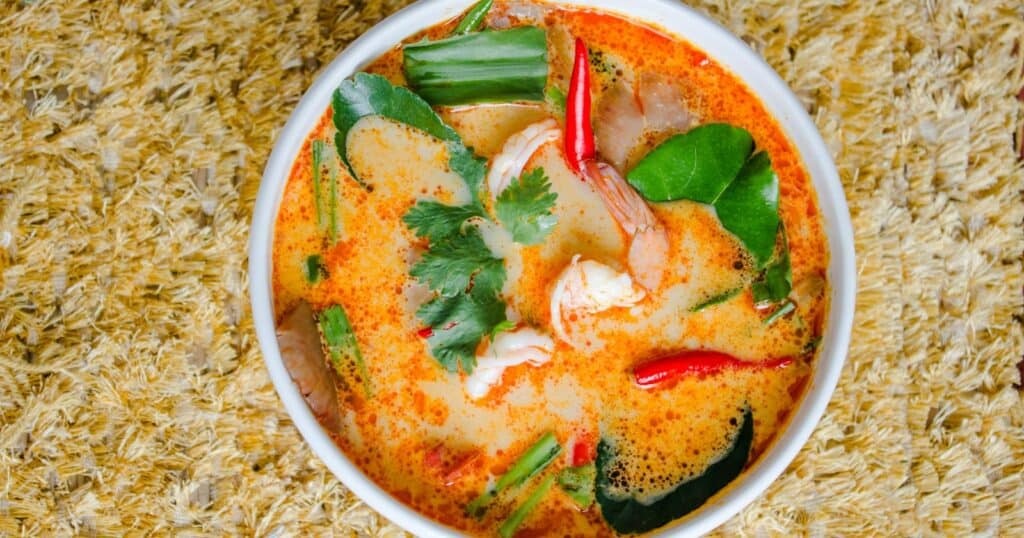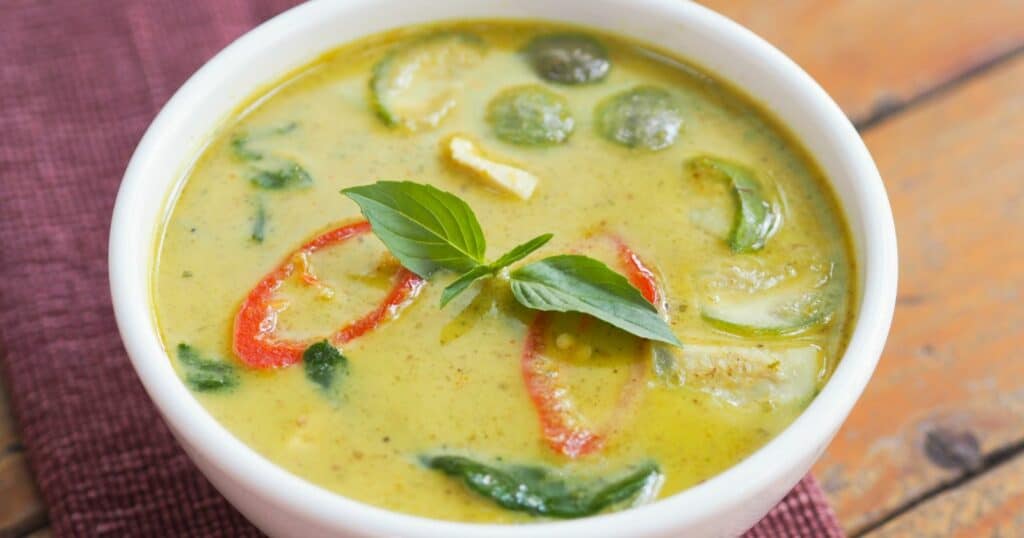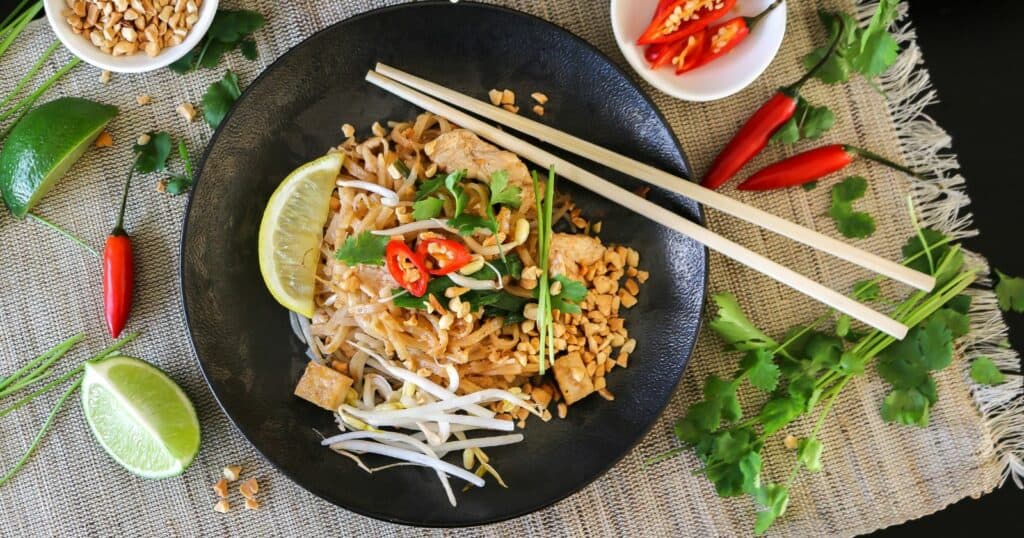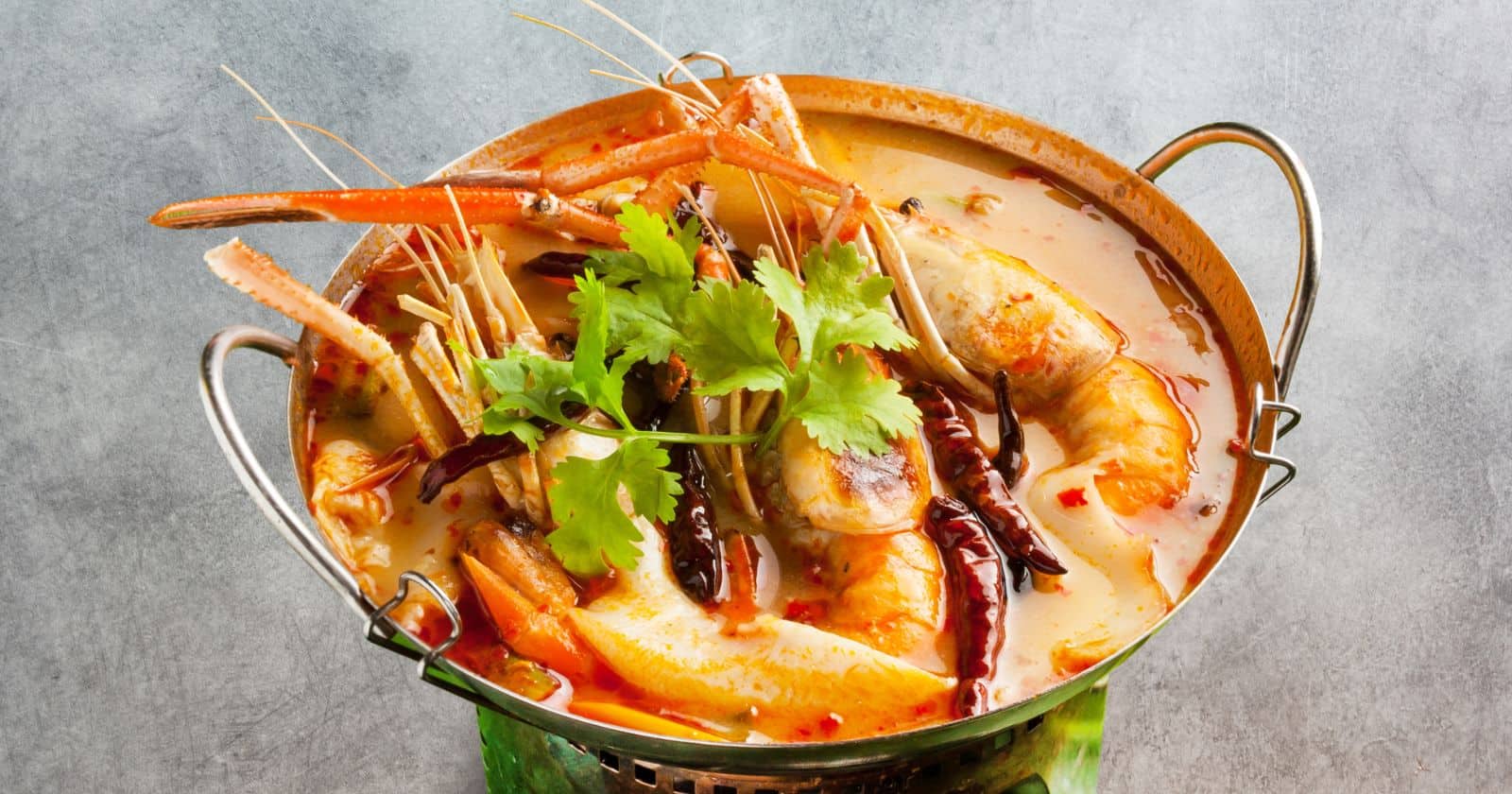Pregnancy comes with a whole host of food cravings and aversions. For many expecting moms, the spicy, sour flavors of tom yum soup seem irresistible. But is this Thai staple safe to eat when you’ve got a bun in the oven?
In this comprehensive guide, we’ll explore everything you need to know about eating tom yum soup during pregnancy. You’ll learn about:
- The potential risks of eating tom yum soup when pregnant
- Safety tips for consuming tom yum soup and Thai food
- The nutritional benefits of this soup
- Experiences and cravings of pregnant women
- Alternatives to satisfy your Thai food pregnancy cravings
Let’s dive in and determine if it’s safe to say “yes” to tom yum soup!
Is Tom Yum Soup Safe For Pregnant Women?

The safety of tom yum soup during pregnancy is somewhat controversial.
Some healthcare providers claim it’s fine to eat in moderation. Others recommend avoiding it completely due to certain ingredients.
Ultimately, there is no conclusive evidence that tom yum soup is unsafe during pregnancy. But it’s smart to exercise caution and consult your doctor.
Potential Risks
Here are a few potential risks associated with eating tom yum soup while pregnant:
- Lemongrass – Known to stimulate menstrual flow and uterine contractions. This can pose risks during pregnancy.
- Raw seafood – Raw or undercooked seafood like shrimp contains bacteria that can cause food poisoning. This poses health risks to mom and baby.
- Spicy heat – Very spicy foods may trigger heartburn, which is already common during pregnancy.
- High sodium – Tom yum soup can be high in sodium, which can exacerbate pregnancy-related swelling and increase blood pressure.
- Foodborne illness – The bacterial risks of raw or undercooked ingredients.
As you can see, there are some possible risks associated with this soup. But not enough to definitively say it should be avoided entirely.
General Safety Tips
Here are some tips for safely consuming tom yum soup and Thai food while pregnant:
- Avoid raw seafood – Opt for dishes made with fully-cooked seafood. Raw or undercooked shellfish and fish can harbor dangerous bacteria.
- Go easy on the spices – Pregnancy can make you more sensitive to spicy heat. Start with mild tom yum soup and add spices slowly.
- Watch the sodium – Ask for low-sodium versions or reduce added fish sauce, which is high in sodium.
- Inspect ingredients – Verify your soup doesn’t contain raw sprouts, papaya, or lemongrass, which may pose risks during pregnancy.
- Practice portion control – Stick to 1-2 small bowls of tom yum soup per week as part of a balanced diet.
Following these tips will help minimize risks and make it safer to indulge those tom yum soup cravings.
The Nutritional Value of Tom Yum Soup
Beyond satisfying cravings, tom yum soup can provide nutritional value during pregnancy.
Here’s an overview of the vitamins, minerals, and nutrients found in this broth-based soup:
Vitamins
- Vitamin A – Supports healthy fetal development and vision.
- Vitamin C – Boosts immunity and collagen production. Helps absorb iron.
- B Vitamins – Important for red blood cell production and development of baby’s brain and nervous system.
Minerals
- Calcium – Helps build strong bones and teeth. Crucial during pregnancy and breastfeeding.
- Iron – Prevents anemia and helps carry oxygen to baby.
- Zinc – Boosts immune health and is vital for cellular growth.
Other Nutrients
- Protein – Helps build fetal tissue and is key for baby’s growth.
- Fiber – Improves digestion and prevents pregnancy constipation.
- Antioxidants – Reduce oxidative damage and inflammation.
In moderation, this soup can provide vitamins, minerals, protein and more for a healthy pregnancy diet.
Risks of Raw Ingredients in Tom Yum Soup
Raw, undercooked, and contaminated foods pose risks during pregnancy. Here are some hazards of consuming raw ingredients in tom yum soup:
Bacterial Infections
Raw or undercooked meats and seafood can contain harmful bacteria like salmonella, listeria, vibrio and more. These can cause serious foodborne illness.
Symptoms include fever, vomiting, diarrhea and abdominal cramps. Infections can lead to dehydration, hospitalization, miscarriage, stillbirth and other complications.
Parasites
Eating raw or undercooked shellfish and fish also raises the risk of parasitic infections like:
- Tapeworms – Can grow up to 30 feet long in the intestines.
- Roundworms – Cause abdominal pain, coughing, fever and more.
- Giardia – Leads to nausea, vomiting, diarrhea and dehydration.
Parasites can be difficult to treat during pregnancy and can spread to the developing fetus.
Food Poisoning
Other raw vegetables and ingredients can also cause food poisoning when contaminated with bacteria like E. coli and salmonella.
This triggers severe nausea, vomiting, stomach cramps, and diarrhea – which can lead to dehydration and hospitalization if severe.
Food poisoning during pregnancy poses risks like miscarriage, premature birth and other complications. It’s critical to avoid undercooked ingredients.
Caution With Lemongrass and Fish Sauce
Two ingredients commonly used in tom yum soup require extra caution during pregnancy:
Lemongrass
This flavorful herb contains citral, which is known to stimulate menstrual flow and uterine contractions.
While this can help induce labor later in pregnancy under a doctor’s supervision, consuming lemongrass in early pregnancy may increase miscarriage risk.
So it’s smart for pregnant women to avoid tom yum soup containing fresh lemongrass. Dried lemongrass or very small amounts of fresh lemongrass are less concerning.
Unfiltered Fish Sauce
This salty Thai condiment adds a savory depth to tom yum soup. But the unfiltered variety may contain parasites and harmful bacteria.
Pregnant women should opt for filtered fish sauce and confirm it has been pasteurized to kill any potential pathogens.
Exercising caution with these two ingredients helps lower risks of complications and side effects.
Healthy Portions and Dietary Balance
Like any dish, tom yum soup can be part of a healthy pregnancy diet in moderation. Here are some tips:
- Eat just 1-2 small bowls per week as part of a varied diet. This limits your sodium intake.
- Balance it out with healthy sides like brown rice, veggies and lean protein.
- Drink plenty of water to stay hydrated.
- Take a probiotic supplement to support your gut health.
- Maintain an active lifestyle with regular exercise.
- Listen to your body and stop eating if you feel any discomfort.
Staying mindful of portions, getting nutrients from a variety of whole foods, and maintaining healthy lifestyle habits allows you to safely enjoy this soup while pregnant.
Pregnant Women’s Cravings and Experiences
Cravings kick into high gear during pregnancy. For many expecting mothers, tom yum soup is one of the most intensely desired foods.
But due to the unknowns around its safety, it also provokes anxiety. Here are some common experiences pregnant women report:
Strong Tom Yum Soup Cravings
Most pregnant women who enjoy Thai food intensely crave the sour, spicy flavors of tom yum soup. Hormonal shifts during pregnancy trigger cravings for strong flavors.
For some women, the craving becomes nearly obsessive. They report needing to eat this soup daily to satisfy the intense urge.
Anxiety Over Eating It
While the craving is strong, there is also anxiety about whether eating tom yum soup could potentially endanger their pregnancy.
Some women strictly avoid eating it, while others give in but feel worried after eating it. More conclusive safety data could help alleviate these concerns.
Satisfying the Craving in Moderation
Many pregnant women satisfy their tom yum soup craving safely by enjoying small portions on occasion, avoiding raw ingredients, and balancing it with other nutritious foods.
Listening to their bodies and practicing moderation allows them to intelligently indulge their cravings without excess worry.
Understanding Ingredient Substitutions
Tom yum soup recipes can vary widely, especially when they are adapted outside of Thailand. Many versions simplify complex ingredients or provide substitutions to make the soup more accessible.
Here are some common ingredient swaps used in tom yum soup recipes:
- Galangal to ginger – Fresh galangal can be difficult to source. Replacing it with fresh ginger provides a similar peppery, citrusy flavor.
- Kaffir lime leaves to lime zest – Kaffir lime leaves are a signature tom yum ingredient. But lime zest makes a readily available substitute that mimics the aroma.
- Seafood broth to chicken broth – Vegetable or chicken broth provides an alternative to a shrimp or fish broth base. This allows pregnant women to avoid seafood risks.
- Lemongrass to lemon juice – Lemongrass stalks infuse broth with citrus flavor. Lemon juice can replicate this taste if lemongrass is not on hand or is a concern.
- Oyster sauce to soy sauce – Oyster sauce adds a savory umami flavor. Subbing in soy sauce provides a similar salty, meaty taste.
- Thai chilies to jalapeño – Spicy Thai chilies can be swapped with more widely available jalapeños for a milder heat.
These ingredient substitutions can change the complex flavor profile of tom yum soup. But they make the soup more accessible for home cooks, including pregnant women looking for safer options. Using appropriate subs allows you to still enjoy the hot, sour taste without hard-to-find ingredients.
Healthy Alternatives and Substitutes
If you decide to avoid tom yum soup altogether when pregnant, you can still satisfy your cravings for Thai flavors with these healthy alternatives:
Coconut Curry Soup

Get a creamier, comforting alternative by using coconut milk instead of broth. Load up this creamy soup with veggies for a perfect pregnancy food.
Chicken Lemongrass Soup
Skip the seafood and use chicken broth infused with lemongrass, ginger, lime juice, mushrooms, and cilantro for a tasty soup that avoids pitfalls.
Hot and Sour Vegetable Soup
Maintain the spicy, sour flavor profile with a veggie-packed broth spiked with chilies, tamarind, vinegar, and lime.
Veggie Pad Thai

Trade the soup for a stir-fry! Rice noodles, tofu, eggs, peanuts, and veggies give you a perfect noodle dish without concerns.
Mango Salad
Capture the Thai flavor with a crisp mango salad with red onion, mint, toasted coconut and a rice vinegar dressing. Avoid fish fermented because it can lead to allergies.
These options help you sidestep potential risks while still enjoying Thai-inspired flavors during pregnancy.
The Takeaway: Enjoy Tom Yum Soup in Moderation
Pregnant women can safely enjoy tom yum soup, provided they take some sensible precautions. Avoid raw ingredients, limit portion sizes, and balance it with other nutritious foods.
While more research is needed, there is no conclusive evidence it’s dangerous during pregnancy. The potential benefits can outweigh the risks when consumed intelligently.
Discuss it with your doctor and listen to your body. If you experience any discomfort after eating it, avoid it for the remainder of your pregnancy.
And if you have intense cravings but want to err on the side of caution, satisfy your tastebuds with pregnancy-friendly alternatives.
Finally, remember that a varied, balanced diet with plenty of vegetables, fruits, whole grains, lean proteins and healthy fats is ideal during pregnancy and beyond!





